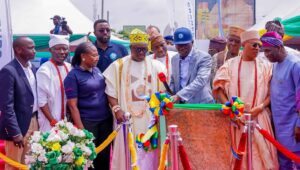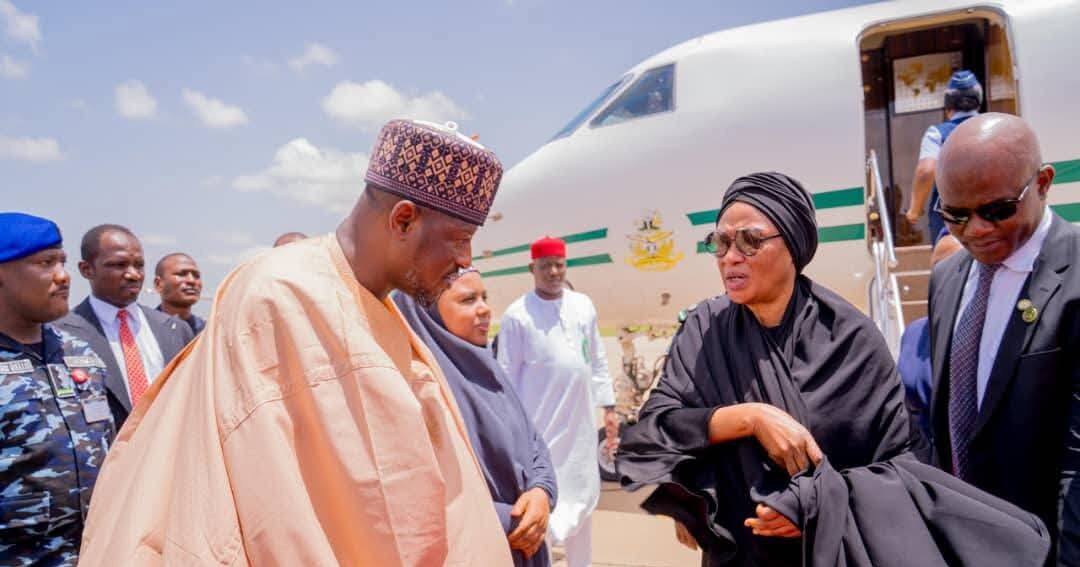- Don’t turn the bridge to trading area, Governor warns.
- Lagos to start test run of Red Line trains
Yaba flyover, one of the four bridges being concurrently constructed by the Lagos State Government along the Red Line rail corridor, is now open to traffic, creating a new commuting and connectivity experience in Lagos Mainland.
Governor Babajide Sanwo-Olu, on Thursday, commissioned the T-shape overpass that will serve as an alternative route to access Ebute Metta, Oyingbo, Yaba and Surulere.
The project, undertaken by Lagos Metropolitan Area Transport Authority (LAMATA), has brought traffic relief to motorists and commuters plying Yaba, as it has solved congestion and delays associated with railway level crossing, which hitherto hindered free movement in the vicinity.
The overpass bridge also eliminated pedestrian and vehicular interference on the rail tracks, significantly reducing the risk of accidents and collisions between trains and vehicles.
A euphoric crowd of residents thronged the ceremony where the Governor and members of the State’s cabinet gathered to formally inaugurate the project.
Sanwo-Olu said the event marked the beginning of the completion phase of the Lagos Rail Mass Transit (LRMT) Red Line, which spans 37 kilometres from Agbado to Oyingbo. He stressed that the delivery of the infrastructure bore testament to his administration’s determination to develop and proffer sustainable solutions to transportation challenges facing the State.
The Governor said the remaining overpasses at Ikeja, Mushin and Oyingbo were at their completion stages, disclosing that the bridges would be opened to traffic before the end of December 2023.
He said: “Today, we are witnessing another leap in the fulfilment of our promise under the Traffic management and Transportation pillar of our development agenda. Three years ago, we undertook the task to construct four bridges across rail lines between Oyingbo and Ikeja, the objective to bring relief to our teeming residents by reducing congestion and improving travel time as well as the cost of commuting. Over the years, we recorded avoidable fatal accidents on railway crossings, most of the time due to human errors.
“Today, we are formally inaugurating a key component of the infrastructure projects initiated to bring about traffic improvement and solutions to the challenges encountered. This event is, therefore, significant because it signifies the completion phase of the Red Line project. Before the end of the year, other overpass bridges at Ikeja, Mushin and Oyingbo will be formally commissioned and there will be no more occurrence of train-vehicle accidents at these locations.”
Sanwo-Olu said the delivery of the Yaba flyover reflected his Government’s plan for an integrated transportation system, stressing that the infrastructure had turned the area to a hub of rapid bus and rail transportation.
In the coming weeks, the Governor said the Red Line trains would begin pre-inauguration test run, as the construction races to the end. This, he said, will be followed by commissioning and formal operations of the metro line in 2024.
Sanwo-Olu urged road users to protect the infrastructure from vandals and arsonists, while also warning against turning the bridge to a trading platform. He served last notice to all those engaging in illegal trading on the railway tracks, instructing law enforcement officers to ensure compliance.
He said: “These projects have been implemented at huge cost. We should not feel unconcerned when societal enemies are bent on destroying our commonwealth. I ask all road users to protect this bridge from vandals and other societal enemies.
“Let me reiterate that this bridge is not a market place; the steps, ramps, and sidewalks are not for displaying wares. Our law enforcement agencies have been given strict instructions to ensure zero tolerance for any misuse of this facility.”
Commissioner for Transportation, Mr. Oluwaseun Osiyemi, said Lagos Strategic Transport Master Plan (STMP) was designed to provide to 25 transport imperatives, which include creation of multiple transport choices for residents, introduction of integrated transport system, making the transit system attractive, convenient, affordable and accessible, reducing urban transportation-induced emissions.
He said the infrastructure would optimise the usage of the road network and aid urban transport planning.
“The STMP also provided for a long term financing of the investment plan,” the Commissioner said.
LAMATA Managing Director, Mrs. Abimbola Akinajo said three out of the four remaining bridges had been completed and awaiting commissioning. The only outstanding project, she said, is the Mushin overpass, which is due for completion by December.
“In the coming weeks, Mr. Governor will be commissioning the remaining overpasses one after the other, until the main project, the Red Line, is commissioned for operations. The operation of the Red Line and its ancillary infrastructure will have an exponential effect on the economy of the State,” she said.










 BIG STORY4 days ago
BIG STORY4 days ago
 BIG STORY5 days ago
BIG STORY5 days ago
 BIG STORY1 day ago
BIG STORY1 day ago
 BIG STORY5 days ago
BIG STORY5 days ago
 BIG STORY5 days ago
BIG STORY5 days ago
 BIG STORY9 hours ago
BIG STORY9 hours ago
 BIG STORY2 days ago
BIG STORY2 days ago
 BIG STORY3 days ago
BIG STORY3 days ago































